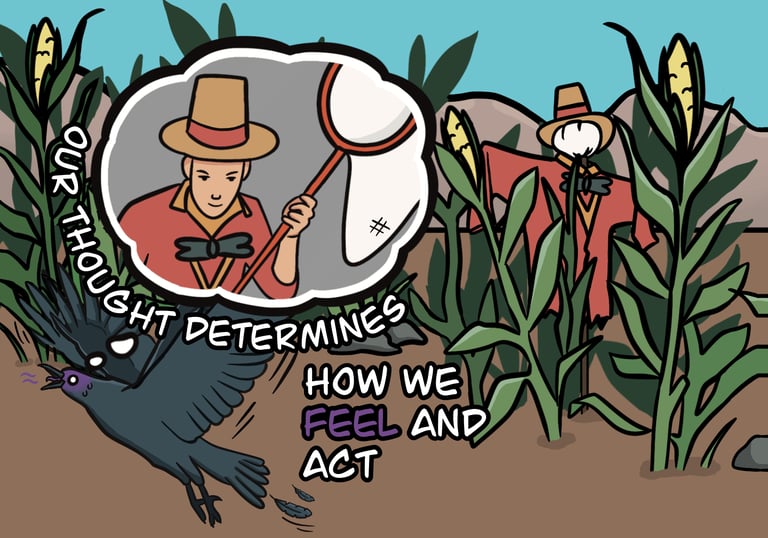Our Thought Determines How We Feel and Act
HEAD/THINKING


Let's dive deeper to understand how these parts of us influence each other within the framework of cognitive-behavioral therapy (CBT). Our thoughts are the driving force behind nearly everything we do. These cognitive processes, which include our perspective, illusion, conclusion or expectation, are incredibly powerful. They shape our feelings and guide our actions. Understanding how this works can help us lead better and more fulfilling lives.
Emotions arise as a direct response to our thoughts. For example, if you think, "I'm going to fail this exam," you might feel anxious. And if you think, "I'm finally graduating," you might feel excited. These feelings of anxiety or excitement stem from the thought itself. It's important to recognize that our emotions are not just random occurrences; they are deeply connected to what we think.
Our actions are often a result of our thoughts. For example, if you think, "I'm finally graduating," you might start planning for graduation trip or preparing for employment interviews. Our actions may also be a direct result of the emotions triggered by our thoughts. Continuing with the earlier example, if you feel anxious about failing an exam, you might avoid studying or procrastinate. This behavior can create a self-fulfilling prophecy, where the fear of failure leads to actions that increase the likelihood of failure. Understanding this cycle can help us break it.
Challenging and Changing Thoughts
One effective way to improve our feelings and actions is to work on changing negative or distorted thoughts to more balanced ones. Cognitive-behavioral techniques can be highly effective for this. Ask yourself if your thoughts are based on facts or assumptions. Are they overly negative or biased? By challenging and reframing these thoughts, you can transform your emotional responses and subsequent actions.
Start by keeping a thought journal to write down your negative thoughts and examine them critically. Reflect using reframing question and replace them with more balanced thoughts. For instance, instead of thinking, "I'm going to fail this exam," try thinking, "I have studied hard, and I just have to do my best." This small change can reduce anxiety and encourage productive behavior like studying. Remember, our thoughts play a crucial role in shaping our feelings and actions. By becoming more mindful of what we think and actively working to challenge and change negative thoughts, we can create a more positive and proactive approach to life.
So...What are your current thinking patterns?
Product of JEM wayoflife
UEN: 53307176C
Contact Us
Want to join the HAY community?
© 2024. All rights reserved.
